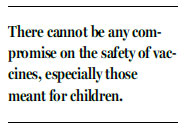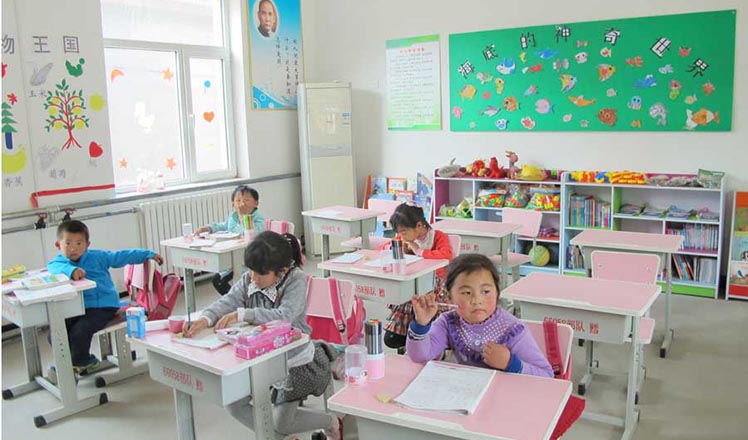A fitting response to the vaccine scandal
Updated: 2016-04-26 08:01
(China Daily USA)
|
||||||||
Editor's note: After an investigation into the vaccine scandal in Shandong province, the State Council, China's Cabinet, held a meeting on April 13 and decided to punish hundreds of government employees, and pass a regulation aimed at strengthening vaccine management. The punishments meted out to government employees included dismissals and demotions. Following are some media reports in response to the decision:
guancha.gmw.cn:
Thanks to the vaccine scandal, people are wondering how the country can have a bright future if even the safety and authenticity of vaccines, especially those meant for children, cannot be guaranteed. Despite the generally safe, reliable and credible use of vaccines in China, the scandal in Shandong has exposed the loopholes in the vaccine management system.
The investigation has revealed the lack of effective supervision, failure to discover and punish those responsible for illegal activities, dereliction of duty by officials and the absence of a sound mechanism against risks led to the distribution of expired and substandard vaccines. Had relevant departments fulfilled their duties and accorded the highest priority to people's health, they would have been able to prevent the scandal.
The regulation passed by the State Council, which is aimed at strengthening the vaccine distribution management, setting up a "from-production-to-use" traceability system and improving the punitive and accountability mechanism, is expected to help establish a long-term vaccine safety management regime to protect public health.
Beijing News:
That 357 government employees have been held accountable for the vaccine scandal demonstrates the central government's determination to punish wrongdoers and officials who don't fulfill their duties, and set the benchmark for quality and safety of vaccines and medicines to eradicate possible safety hazards in the public healthcare sector.
Punishing so many government employees and putting in place a broad accountability system reflect the government's serious efforts to handle such public health-related cases, which will help ease people's anxiety and ensure thorough follow-up investigations. The launching of the accountability system in response to the vaccine scandal suggests it could become a standard formula to handle similar problems in the future. The punishment meted out to 357 government employees has also broken the illusion that a big group of officials cannot be penalized simultaneously.
However, serious cases like the vaccine scandal cannot be solved by just holding 357 officials accountable. To prevent such cases there is need to correct all the institutional flaws in the vaccine production and distribution system, and strengthen their management. Thus, it is hoped stricter accountability measures will also apply to officials who fail to fulfill their supervisory role to win back public trust.
guancha.gmw.cn:
Aside from the 202 persons who have been detained for their roles in the vaccine scandal, the administrative punishments handed down to 357 government employees, including dismissals and demotions, show the central government has "zero tolerance" toward the production and distribution of substandard vaccines.
The prompt launch of the accountability mechanism is expected to deter potential officials from neglecting their duties. But by holding just a few hundred officials accountable, the government cannot prevent such scandals in the future. Instead, the timely publication of the full investigation results, along with the vow to improve drug and vaccine supervision and management systems will help set up a long-term and effective vaccine management mechanism.
There cannot be any compromise on the safety of vaccines, especially those meant for children. And anyone who violates this principle should be held accountable.

(China Daily USA 04/26/2016 page12)

 30th anniversary of the Chernobyl nuclear disaster marked
30th anniversary of the Chernobyl nuclear disaster marked
 Shanghai unveils Disney-themed plane and station
Shanghai unveils Disney-themed plane and station
 Hebei's poverty-stricken village gets new look after Xi's visit
Hebei's poverty-stricken village gets new look after Xi's visit
 Cooks get creative with spring food exhibition in central China
Cooks get creative with spring food exhibition in central China
 The world in photos: April 18- April 24
The world in photos: April 18- April 24
 People have fun in pillow fight held in Kiev
People have fun in pillow fight held in Kiev
 Laotian wives in East China's Anhui province
Laotian wives in East China's Anhui province
 Couples get married in their 'birthday suit'
Couples get married in their 'birthday suit'
Most Viewed
Editor's Picks

|

|

|

|

|

|
Today's Top News
Liang avoids jail in shooting death
China's finance minister addresses ratings downgrade
Duke alumni visit Chinese Embassy
Marriott unlikely to top Anbang offer for Starwood: Observers
Chinese biopharma debuts on Nasdaq
What ends Jeb Bush's White House hopes
Investigation for Nicolas's campaign
Will US-ASEAN meeting be good for region?
US Weekly

|

|